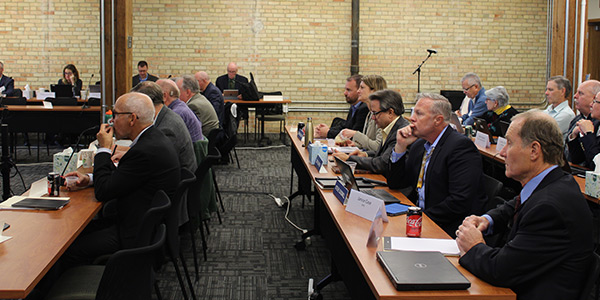By Hudson Sangree
SALT LAKE CITY — The reliability coordinator transition in the West in 2019 led the discussion at the year’s final quarterly meeting of the Western Electricity Coordinating Council’s board of directors on Tuesday and Wednesday.
“This will absolutely be at the top of the priority list for 2019,” WECC CEO Melanie Frye told those gathered at the group’s headquarters, echoing the sentiment she expressed at the board’s previous quarterly meeting. (See Western RC Transition ‘Hot Topic’ at WECC Meeting.)
Peak Reliability’s decision to quit its RC role across WECC’s footprint and hand off duties to CAISO, SPP and BC Hydro by the end of 2019 comes with potential pitfalls, including staff attrition at Peak and the lack of any real backup plan should major problems arise, speakers said.
Peak stunned the Western electricity sector in July when it unexpectedly announced it would wind down operations just months after kicking off a push to create a regional organized market in partnership with PJM. (See Peak Reliability to Wind Down Operations.)
“What happens if things really go bad?” WECC Chair Kristine Hafner asked. “Is there an emergency response team?”
It fell to Jim Shetler, general manager of the Balancing Authority of Northern California and chair of Peak’s Member Advisory Committee, to brief WECC board members on the RC transition’s shortcomings and the procedures that have been put in place to help head off problems. Though Shetler has no official position with WECC, he’s become a de facto point person for the RC transition.
Peak has been losing staff members who, with their employer’s end in sight, decided to find new jobs, Shetler told the board. Some in Washington and Colorado took positions with electricity entities in those regions, he said.
To stem attrition, Peak detailed the severance packages that each employee will receive if they stay with the company until they’re no longer needed, he said.
With that, Shetler said, “the unplanned departures, I expect, will come down quite a bit.”
Peak and other companies are also exploring the idea of a mutual assistance program, under which employees who leave the organization early and take jobs elsewhere could be loaned back if they’re needed, he said.
Another potential problem is that there are four major transition dates planned through 2019, and something could go wrong each time, Shetler said.
“That is four opportunities for ‘aw shit,’” he said.
CAISO will assume the RC role for its existing territory on July 1, 2019. BC Hydro will become the RC for a large swath of southwestern Canada on Sept. 2. CAISO will then take over RC services for many areas outside of California on Nov. 1, while SPP will take responsibility for other parts of the West on Dec. 3.
Shetler said the latter dates are worrisome because they provide no room for error. Peak essentially will be out of the RC business on Dec. 4 and won’t step back in if things go wrong, he said.
He and others are hoping that some of the transition dates will be moved up. “We just think from a risk standpoint that makes sense,” he said.
Shetler said that in addition to the multiple transition dates, “what keeps me up nights [is worry over] whether Peak is a going concern in the next 12 months.” With the company in the unusual position of planning its own demise, there’s no certainty it will remain a viable business throughout 2019, he said.
In comments after the meeting, Linda Jacobson-Quinn, regulatory compliance manager for the Farmington Electric Utility System in New Mexico, said the municipal utility and others were concerned about the transition because of how it could affect their systems if reliability coordination lapses.
Farmington owns fewer than 200 miles of 115-kV transmission lines in the Four Corners area and operates two small gas-fired power plants, she said. The utility is too small to seriously disrupt the grid, “but a lot of times the larger grid can have a significant impact on us,” she said.
Frye said 2019 will be year of challenges for reliability in the West.
“This is a risky year, and I think everyone’s posture is really focused on this,” she told the board and audience. “At the end of the day, it’s the customers that must have an RC.”






